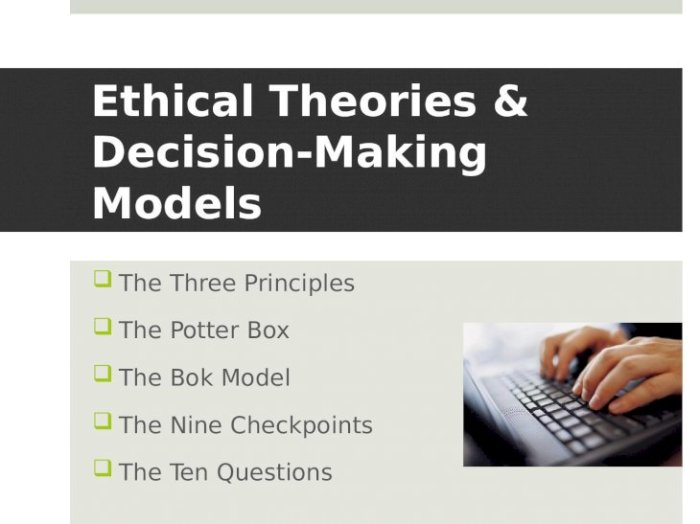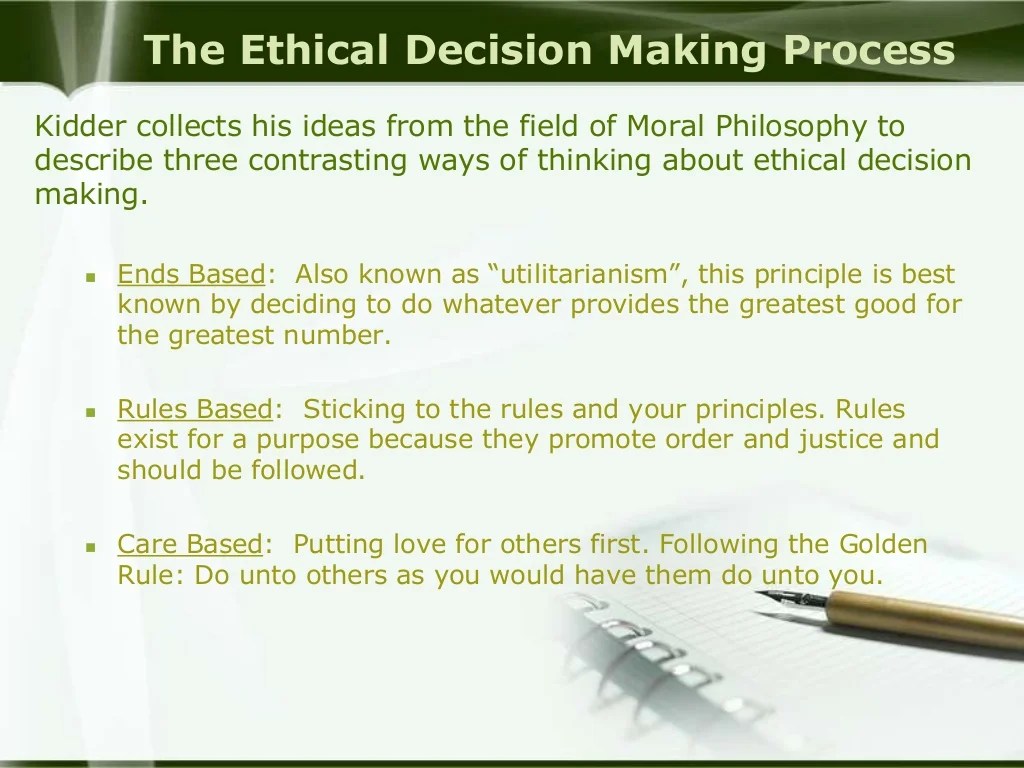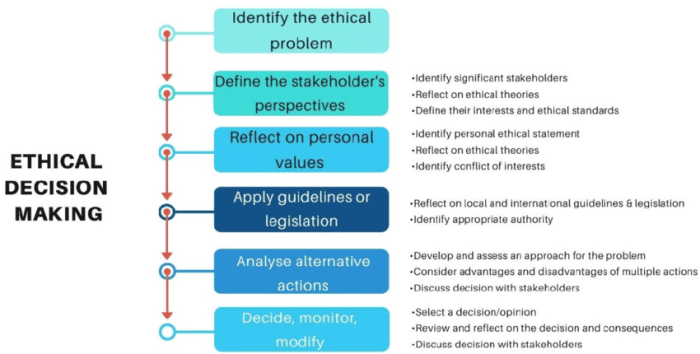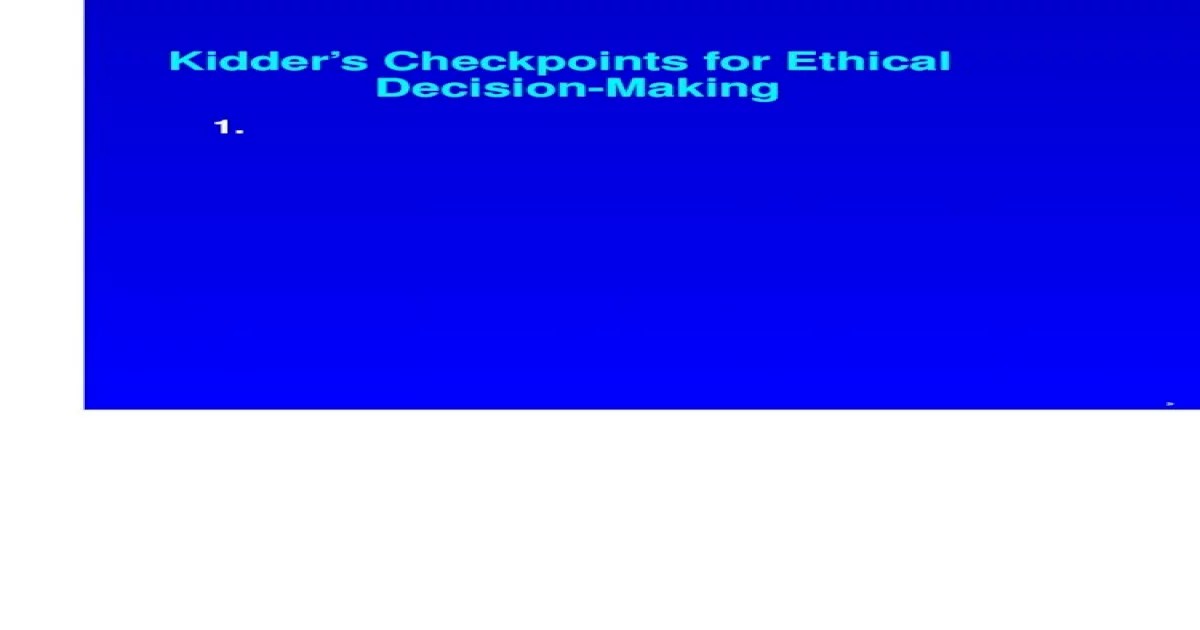Nine checkpoints for ethical decision-making – Embark on an enlightening journey into the realm of ethical decision-making, guided by the invaluable Nine Checkpoints. This comprehensive framework empowers individuals and organizations to navigate complex moral dilemmas with clarity and integrity, fostering responsible choices in all spheres of life.
The Nine Checkpoints serve as a roadmap for ethical decision-making, providing a systematic approach to evaluating the potential impact of actions, considering diverse perspectives, and upholding fundamental values. Their significance extends beyond personal conduct, shaping ethical practices within organizations and society at large.
Overview of Nine Checkpoints for Ethical Decision-Making

Ethical decision-making involves considering the moral implications of one’s actions and making choices that align with societal values and ethical principles. The nine checkpoints for ethical decision-making provide a structured framework to guide individuals and organizations in making ethically sound decisions.
These checkpoints are:
- Identify the ethical issue
- Gather the facts
- Identify the stakeholders
- Identify the ethical principles involved
- Consider the potential consequences
- Make the decision
- Reflect on the decision
- Communicate the decision
- Monitor the decision
Importance of Ethical Decision-Making in Various Contexts: Nine Checkpoints For Ethical Decision-making

Ethical decision-making is crucial in various contexts, including personal, professional, and societal settings. In personal life, it helps individuals make choices that align with their values and principles. In professional settings, it ensures that organizations operate ethically and responsibly. Societally, it contributes to the well-being of communities and promotes social justice.
Ethical dilemmas arise in different contexts. For example, in personal life, individuals may face decisions about honesty, loyalty, and fairness. In professional settings, organizations may grapple with ethical issues related to sustainability, employee rights, and data privacy. Societally, governments and policymakers must make decisions that balance economic growth with environmental protection and social equity.
Applying the Nine Checkpoints in Practice

To apply the nine checkpoints in practice, decision-makers should:
- Identify the ethical issue:Clearly define the ethical issue at hand and understand its moral implications.
- Gather the facts:Collect relevant information and data to inform the decision-making process.
- Identify the stakeholders:Determine who will be affected by the decision and consider their perspectives.
- Identify the ethical principles involved:Identify the ethical principles that are relevant to the issue, such as justice, fairness, autonomy, and non-maleficence.
- Consider the potential consequences:Analyze the potential consequences of different decision options and their impact on stakeholders.
- Make the decision:Based on the analysis, make a decision that aligns with ethical principles and the best interests of stakeholders.
- Reflect on the decision:After making the decision, reflect on its ethical implications and consider any alternative options that were considered.
- Communicate the decision:Clearly communicate the decision to stakeholders and explain the ethical reasoning behind it.
- Monitor the decision:Regularly monitor the implementation and impact of the decision to ensure that it continues to meet ethical standards.
Case studies and hypothetical examples can illustrate the application of the checkpoints. For instance, in a hypothetical case involving a company’s decision to lay off employees, the checkpoints would guide the decision-makers to consider the ethical implications of job loss, the impact on employees and their families, and the long-term consequences for the company’s reputation.
FAQ Insights
What are the benefits of using the Nine Checkpoints for Ethical Decision-Making?
The Nine Checkpoints provide a structured approach to ethical decision-making, reducing biases and ensuring a comprehensive evaluation of potential outcomes. They promote transparency, accountability, and consistency in decision-making processes, fostering trust and ethical behavior within organizations and society.
How can I apply the Nine Checkpoints in real-world scenarios?
To apply the Nine Checkpoints, begin by identifying the ethical dilemma or decision to be made. Systematically work through each checkpoint, considering the potential impact of your actions, the rights and interests of stakeholders, and the alignment with ethical principles and values.
Document your analysis and rationale for transparency and accountability.
